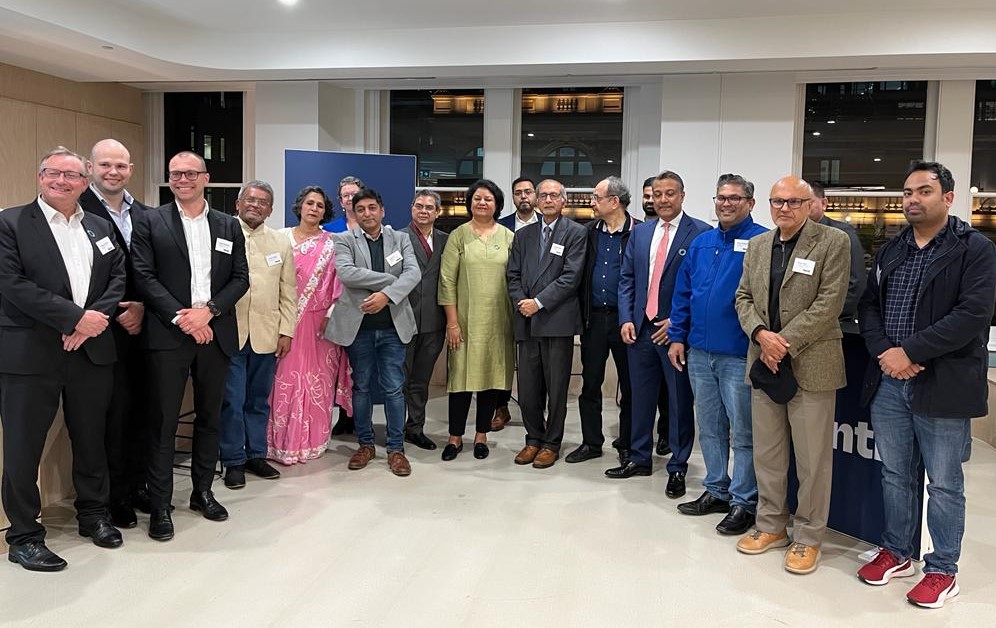Sumant is a world leader in renewable energy

By Vijay Badhwar
Experiencing incessant rains, a record with half a year still to go, and fires going in parts of otherwise cold Western Europe, one would like to know why the governments are so slow to react to climate change from the likes of Sumant Sinha who runs a mega renewable energy company, ReNew Power, that is valued at more than $US four billion on NASDAQ.
Sumant was in Sydney taking part in Federal Government organised Sydney Energy Forum held on July 12. Then struck the foresight of fellow IITian Pradeep Khanna CEO of GlobalMindset to introduce Sumant to the local crowd. Pradeep joined hands with Plenti financial institution to host Sumant Sinha and a former senior bureaucrat in India, Gauri Singh, now Deputy Director General of IRENA, a renewable energy agency located in Dubai, to organise a thought leadership and ‘meet and greet’ session – Renewables – Global Trends and India Story.
“India, the largest democracy in the world, has a big role to play to ensure resilient clean energy supply chains,” said Sumant Sinha. “A case in point is China which controls 80-90 per cent of solar panel market, and with a shock such as what we’ve experienced with Russian oil and gas supply being blocked with Ukraine war, the world will be on its knees.” The scenario could manifest with closing down of one solar factory in China due to any disaster. That kind of dependence is not good. India as a world leader in renewable energy market, leaving China, could avert such disaster, he said.
The renewable energy industry competes only with coal and not the oil and gas sector. These companies are reaping huge profits in today’s unique situation when the supply is short, as well as the demand is high. But oil and gas companies don’t want to divert their profits to invest in the renewable markets. They, themselves, want to handle investment in the renewable market making it hard for new players to provide impetus to the market.
Mr Sinha begrudged the inertia ridden bureaucratic norms compounded with the banking sector not backing up the renewables sector. “The markets are only interested in short-term profits, not providing much needed investment in the renewable energy sector. With bond markets also closed to such investments impedes the growth in this sector,” he said.
“The renewable sector needs investments in the order of $US four trillion in a year, whereas only one trillion is being invested in the market. In India, the plan is to produce 450 GW by 2030 but only 40 GW a year is being introduced, leaving a huge gap,” Mr Sinha said.
But Sumant said he was pleased with India’s progress in solar, wind and advances in EV market, especially in green hydrogen sector in which the country leads. It’s a bumpy transition. We all know the direction of travel, not how to get there, he concluded.
Gauri Singh, a former IAS and a senior bureaucrat, developed policy framework of National Solar Mission of India to build solar power capacity in India. She transitioned to Renewable Energy Agency in Dubai, IRENA, to facilitate co-operation and sustainable renewable energy development.
Gauri Singh said the production of renewable energy was the easy part. The challenges were financial, training and adaptation implications at individual, social and company levels. She was pleased with Indian Government initiative in the renewables sector by creating a separate fund to invest in the sector.
She considered the QUAD group, although not a significant block in the renewables sector at this stage, had the potential to become a significant player in future. They should support India in the business of sustainability.
Pradeep Khanna moderated the session and summarised the discussion with some of the important points being
- Everyone is keen to fast track the move to the green economy, however who is going to pay for the transition still appears to be under discussion
- Some of the incentives could be to offer green finance at lower interest rates
- India could potentially be a base for manufacturing for solar and Australia for research/design/ development
- There will be a significant requirement of Skills and India could potentially be a source for green skills
Short URL: https://indiandownunder.com.au/?p=18163
